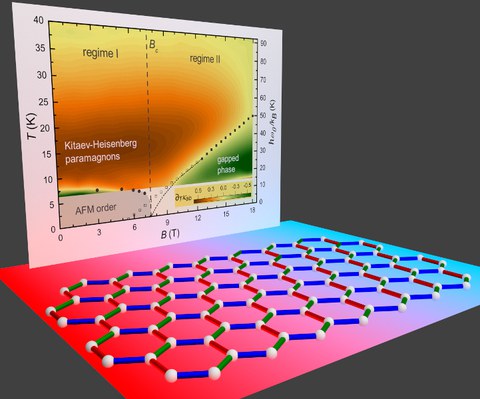Jun 06, 2018
Research: Thermal Transport and Spin-Phonon Coupling in α-RuCl3
We have shown that longitudinal heat transport in α-RuCl3, a local moment system with mounting evidence to be proximate to a Z2 qquantum spin liquid is primarily of phononic type. Specifically, this pertains to a field-induced low-temperature peak observed in the heat conductivity κ. Most important, we find the heat transport to be dramatically
renormalized through spin-phonon scattering by the magnetic excitations of α-RuCl3. We have detailed this by applying in-plane magnetic fields, dissecting the temperature dependence of κ into two regimes, I and II, below and above the critical field of the Néel phase. The scattering of phonons off the magnetic excitations is particularly strong in regime I, consistent at first sight with the incipient long range magnetic order at temperatures above the Néel phase. However, the magnitude of the low-temperature increase of κ in the ordered phase is relatively small, compared to a dramatic enhancement in regime II. This implies that even in the ordered phase, strong magnetic fluctuations exist, consistent with a significantly reduced magnetic moment, observed in neutron scattering. These residual degrees of freedom scatter the phonons and are likely to persist down to zero energy. Since heat at low temperatures is primarily carried by acoustic phonons, we conclude that the low energy magnetic excitations relevant for the scattering are of small total momenta. In view of the enhancement of the heat conductivity in regime II, this suggests strong field-induced changes of the magnetic excitation spectrum close to the Γ-point. The field-induced spin gap we extract is surprisingly large, since at 18T it is already of the order of the Kitaev exchange in α-RuCl3.
R. Hentrich, A. U.B. Wolter, X. Zotos, W. Brenig, D. Novak, A. Isaeva, T. Doert, A. Banerjee, P. Lampen-Kelley, D. G. Mandrus, S. E. Nagler, J. Sears, Y. June-Kim, B. Büchner, C. Hess,
Unusual Phonon Heat Transport in α-RuCl3: Strong Spin-Phonon Scattering and Field-Induced Spin Gap,
Phys. Rev. Lett. 120, 117204 (2018)

